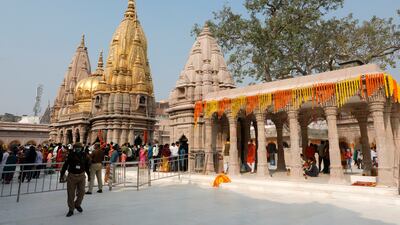India’s southern Karnataka state government has defended a decision by Hindu temples to bar Muslim traders from doing business at religious fairs, a move seen as a punishment for the minority community’s defiance of the court ruling outlawing hijabs for Muslim students.
The coastal state’s Hindu endowments law, which is about two decades old, prohibits leasing temple properties to people from other faiths but the rules were rarely applied. Now, right-wing Hindu groups are demanding Muslim traders be excluded from the popular fairs.
Banners announcing the ban have been hung outside at least six temples in the state.
Dozens of temples in Karnataka hold annual three month-long fairs beginning in March. The events draw huge crowds and small traders generate revenue running into the hundreds of millions of rupees.
But per media reports, the banners in the local Kannada language stated that there will be “no permission for those who are against the constitution” — a reference to widespread Muslim protests against the banning of the hijab for students.
In coastal Mangaluru city, the Hosa Marigudi temple barred Muslim traders from setting up stalls at the annual Suggi Mari Puja on Tuesday.
Another temple in Shivamogga district also cancelled allotments belonging to Muslim traders.
“If they don’t accept the court’s verdict on hijab then why should we not follow the law? They are doing a drama … they are a minority yet are dominating the Hindu majority,” an administrator at the Hosa Marigudi temple told The National.
The ban has sparked fresh debate in the state, which is ruled by Prime Minister Narendra Modi’s Hindu nationalist Bharatiya Janata Party.
The government imposed a ban on the hijab in December over claims that it violated uniform rules in schools. The order led to weeks of protests and counter-protests by both Muslim and Hindu students.
The state’s minority Muslim community claims the ruling is a direct attack on their religion.
The ban was temporarily upheld by the Karnataka High Court in February after some Muslim students appealed against it. But the court made its final judgment in March, ruling that the headscarf was not an essential practice in Islam.
A challenge to the judgment was brought before the Supreme Court last week but the justices have twice refused to hear the appeal on an urgent basis.
Many Islamic organisations in the state last week called for a statewide shutdown and appealed to Muslim traders to close their businesses in protest of the court verdict.
Capt Ganesh Karnik, Karnataka state representative, told The National that the exemption of Muslims from temple fairs was in line with state law but suggested the move was primarily the Hindu community’s reaction to Muslims' “belief in Sharia”.
“It is a societal move … as per the act, the temple premises and activities should only have faith and believe in Hindu way of worship and puja,” Mr Karnik said.
“The majority community had been silent all this while but it is a reaction from them. People are today demanding that if [Muslim] people don’t respect the court verdict and believe in Sharia, hijab, let them not come to temples.”
Mr Karnik claimed that there were social media videos showing Muslim traders spitting on flowers and fruits meant as temple offerings.
Many Muslim traders say the ban will further divide the communities and hamper the revival of their businesses after back-breaking losses caused by the pandemic.
“We did not have any business for the last two years because of Covid-19 and as we begin to start earning again, we have been left out by the temple committees,” said Mohammed Arif, secretary of Udupi District Street Vendors and Traders Association.


